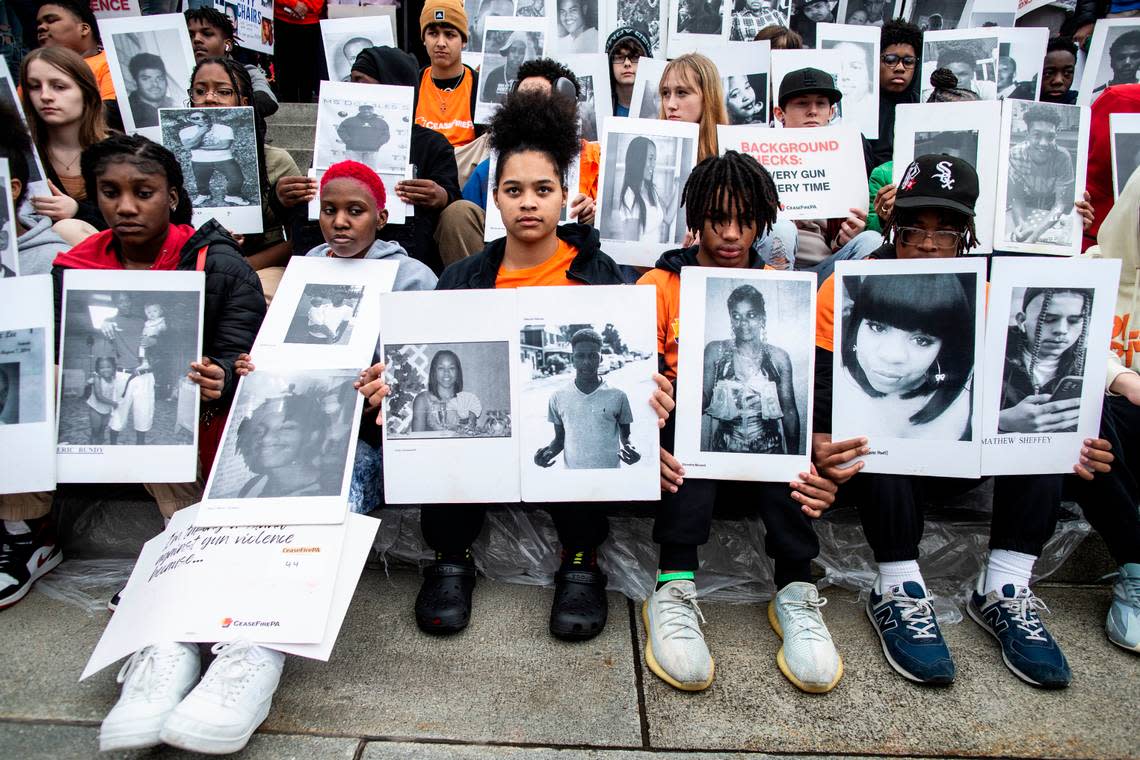Pennsylvania House hearing points toward movement on gun legislation

The Pennsylvania House Judiciary Committee held a hearing on gun violence Thursday, with the Democratic majority indicating they intend to move forward with legislation to tighten the state’s firearm laws.
Thursday’s committee session was preceded by a rally and canvassing event in support of stricter gun laws organized by CeaseFire PA and other advocacy groups, and the testimony presented to the committee largely dovetailed with those demands.
“I kept hearing ‘safe storage’ and ‘lost and stolen’ (gun reporting) from today’s hearing,” Judiciary Chairman Tim Briggs, D-Montgomery, said following the hearing. Both of those policies were among those identified as priorities by CeaseFire advocates.
“We’ll look at all of them, and there’s dozens of others,” Briggs said of the pieces of gun legislation in Harrisburg, with the goal being to “try to come up with some priorities based on what we heard.”
“We want to make sure that the bills that are introduced are vetted by all the stakeholders,” Briggs said.
He predicted the committee would be prepared to move legislation by the summer. “I don’t want to go into the end of this spring session without addressing something Pennsylvanians want us to do,” he said. “We were elected to be in the majority and we have to show Pennsylvania what our priorities are.”
With Democrats now holding a slim majority in the House, Thursday marked the committee’s first substantive discussion of gun policy since passage of a domestic violence measure in 2018; former committee chair Rob Kauffman, R-Franklin, routinely squashed other gun-related legislation without debate.
Thursday’s hearing, as with the rally on the capitol steps that preceded, featured emotional testimony from those who had lost loved ones to gun violence.
“Why do we accept this as a reality when it is an entirely man-made, uniquely American problem with a solution?” posed Meredith Elizalde, whose son was killed in a shooting at Philadelphia’s Roxborough High School that also wounded several other students.
Multiple speakers described a growing problem with unfettered access to firearms, resulting in accidental deaths among small children as well as suicides and crimes committed with guns that are readily available on the black market due to lax oversight.
Pennsylvania’s overall firearm mortality rate – including suicides, homicides, and accidental deaths – spiked from 11.7 deaths per 100,000 people in 2019 to 13.6 in 2020, according to the CDC, consistent with the rest of the nation in seeing a record increase.
Further CDC data, referenced at several points Thursday, shows firearms overtaking automobiles starting in 2020 as the leading cause of death in the 1-19 age bracket. But even those numbers “don’t tell the human story of our children,” said Erin O’Brien, a prosecutor with the Chester County District Attorney’s office.
“I learned that there are no words to tell a mother than her 4-year-old baby is gone and her 18-year-old son will have to live with the consequences,” O’Brien said, describing a case in which a child died after finding and playing with his brother’s gun.
As Briggs noted, the bulk of Thursday’s testimony pointed toward three policy solutions: requiring guns to be kept under child-proof lock, requiring owners to report lost or stolen guns to police within a specified time after they discover them missing, and expanding background checks to include the sale of long guns between parties who are not licensed dealers, where checks are currently not mandated.
All three of those proposals have been introduced in the legislature, and Gov. Josh Shapiro has expressed support for such measures generally.
Only two Republican legislators offered specific pushback during Thursday’s hearing, with Rep. David Rowe, R-Snyder, saying mandatory reporting “makes the victim a victim themselves” if a person whose gun is stolen is then penalized for failing to report it.
“Would we penalize a rape victim for not having the ability to come to terms with exposing their rapist? Of course we wouldn’t,” Rowe posed, a comparison which earned him criticism from several Democrats as well as from Kauffman.
“While I may not use the inarticulate words of my colleague Rep. Rowe,” Kauffman said, he also shares similar concerns about such laws.
“I don’t survey my firearms on a daily basis, I don’t walk around looking for them,” Kauffman said. “If it was gone, I may not know until I go to the range and see that it is missing. That doesn’t make me a criminal, that makes me a law-abiding gun owner who’s a victim of a crime.”
Most such laws, including what has been pitched in Pennsylvania, would apply a mandatory reporting timeline only once the owner discovers the gun is gone.
Further, York City Police Commissioner Michael Muldrow said in response to Kauffman that, from his perspective, such a law would be important as a deterrent to those who might insist their gun was stolen – but in reality had sold the weapon for illicit purposes, something Muldrow said he frequently encounters in investigations.
Several advocates and lawmakers also made a push to broaden the scope of the issue beyond Pennsylvania’s urban areas that are seeing gun homicide increases, and include rural areas where gun suicides are a major problem.
“That doesn’t diminish what is happening in Philadelphia, but what it does point out is this isn’t just a problem in Philadelphia, this is a statewide problem,” said CeaseFire PA Executive Director Adam Garber.
A 2018 study from the Center for Rural Pennsylvania found that climbing suicide rates over the prior two decades had disproportionately impacted rural areas. Suicide frequency in rural counties was 25 percent higher than urban ones, with rates closely corresponding to the rate of handgun sales, according to the study.

